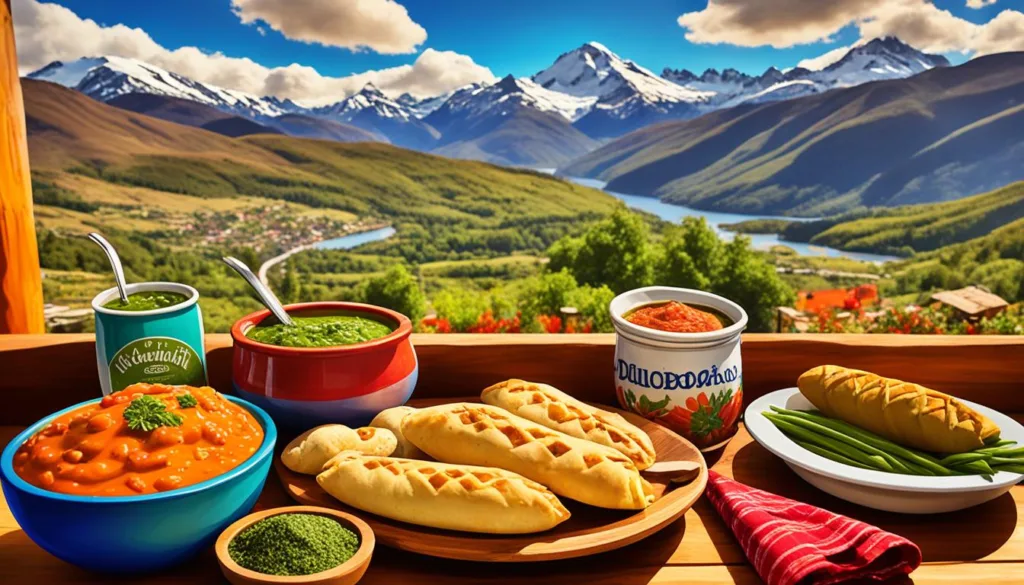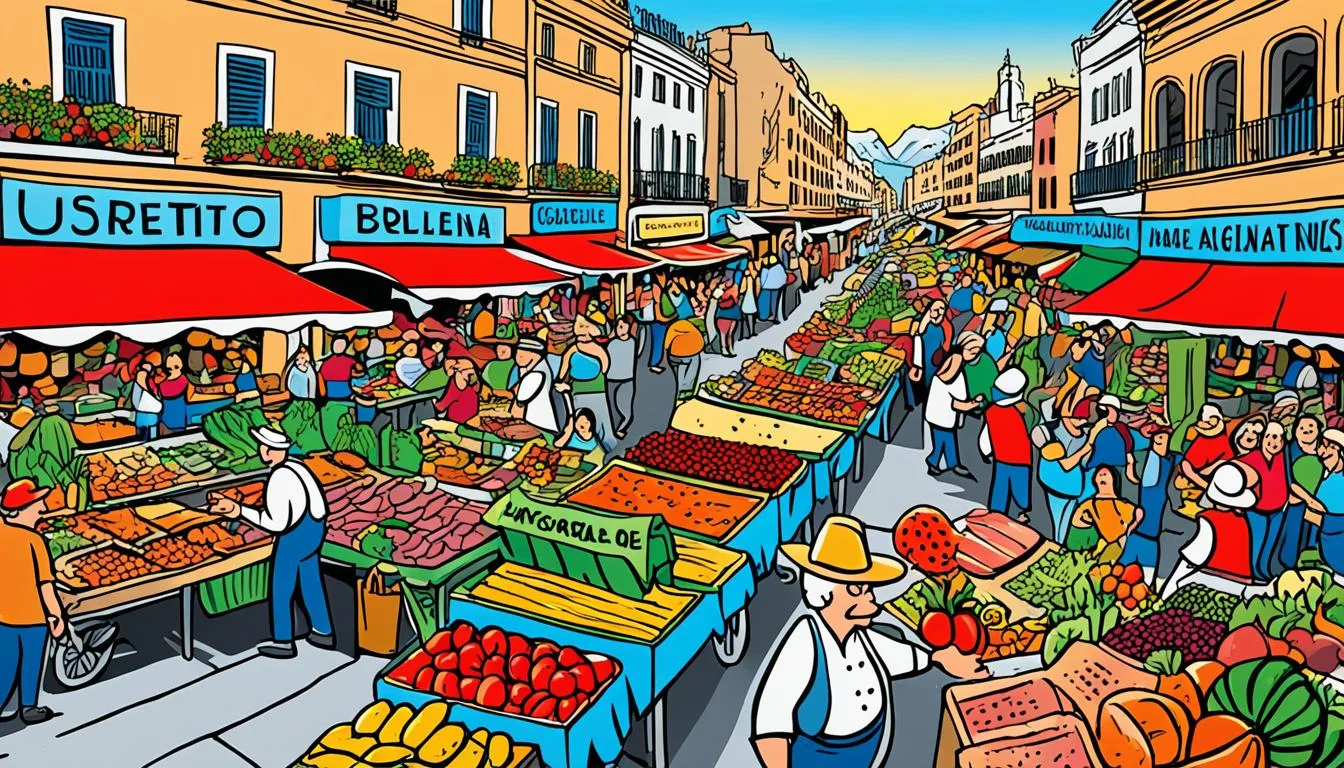Did you know that Argentina is the fifth largest producer of wine in the world? While renowned for its rich Malbecs and robust reds, wine is just a precursor to the country’s expansive culinary heritage, offering a complex fusion of flavors that tells the story of its European and indigenous roots. Argentina beckons as a veritable feast for the senses, inviting culinary journeys that dance across the palate with its diverse dishes. From the sacred ritual of asado to the sweet, caramel-laden lure of dulce de leche, Argentine Cuisine Exploration takes you on an epicurean voyage through a country whose passion for food is as vast as its landscapes.
Ready your palate for a vibrant exploration of Argentine gastronomy. The rich cuisine of this South American nation not only reflects its storied history but also showcases the Argentine spirit through its sensational culinary expressions. Embrace the chance to delve into Argentina’s culinary heritage—where sizzling grills and bursting flavors are not mere aspects of dining, but integral parts of a shared cultural narrative that is ripe for exploration.
Key Takeaways
- Argentina’s wine production sets the stage for a broader exploration of their rich cuisine and diverse dishes.
- Experience the vibrancy of Argentina’s culinary heritage through its signature barbecue asado and saccharine treats like dulce de leche.
- A culinary journey through Argentina is not simply about food, but the embodiment of national pride and cultural storytelling.
- Discover the impact of European (mainly Spanish and Italian) heritage on the evolution of Argentine culinary traditions.
- Embrace the sensory adventure that is Argentine Cuisine Exploration, from savory meats to delectable sweets.
- Understanding the unique gastronomic tapestry of Argentina can deepen the appreciation for its global culinary significance.
The Heart of Argentine Gastronomy: Empanadas, Asado, and More
At the very heart of Argentine gastronomy, the traditions of food preparation and consumption go far beyond simple eating; they represent a culture that relishes every aspect of its culinary heritage. Delving into this vibrant food scene, one must start with the staple of Argentine cuisine—the renowned empanadas. These flavorful pastries are a national favorite, with a rich variety of fillings that mirror the country’s regional nuances. From juicy meat fillings enhanced with spices in the north to the savory cheese and onion mixtures in the south, empanadas tell a story of Argentina’s local taste profiles and creativity in the kitchen.
Equally essential to the Argentine dining experience is the asado, a barbecue that is much more than a method of cooking; it is a social ritual where friends and family gather around the fire to enjoy perfectly grilled cuts of meats. The smoky aroma of the asado is a testament to the longstanding culinary traditions of Argentina, where the grill epitomizes the nation’s love for high-quality beef—a legacy of the gaucho lifestyle.
When the chill of the Argentine winter sets in, kitchens across the country simmer with the hearty and soul-warming locro stew. This traditional Argentine dish is a medley of corn, beans, and various meats that offer comfort and warmth, traditionally served with a robust glass of Argentine red wine. Such traditional Argentine dishes reflect not just the taste palate but the adaptability of the country’s cuisine to the shifts of the seasons.
Diving into the origins of these flavorsome foods, one finds roots that are deeply entrenched in the gastronomic practices handed down through generations. The wide range of traditional Argentine dishes available today has assimilated influences from the Spanish and Italian immigrants, who left an indelible mark on the country’s food scene. It’s this meld of the native and the foreign that has given rise to a vibrant culinary identity, one that is eager to welcome the famished traveler to its abundant table.
- Discover region-specific empanada recipes that showcase Argentina’s diversity.
- Experience the communal joy of a weekend asado with friends.
- Savor the heartiness of locro stew during the colder months.
A journey through the heart of Argentine gastronomy is, without a doubt, a journey through a robust and jubilant celebration of tastes, textures, and time-honored traditions, beckoning the world to its festive table.
Argentine Cuisine Exploration: An Epicurean Adventure
Embarking on an Argentine Cuisine Exploration unveils a heritage of flavors, deeply rooted in the country’s history and cultural interactions. Whether you’re a culinary enthusiast or a passionate foodie, exploring Argentine gastronomy is an exhilarating journey through taste, tradition, and innovation.
The Heritage of Flavors: Indigenous and European Influences on Argentine Food
Delving into the vibrant world of Argentine culinary culture reveals a fascinating blend of indigenous techniques and European ingredients. The fusion of these diverse culinary practices has given birth to some of the most iconic and traditional Argentine dishes savored across the globe today.
A Guide to Traditional Argentine Dishes You Must Try
Argentina’s culinary landscape offers an array of mouthwatering dishes that are sustenance for the soul and a feast for the senses. From the succulent asado to the delectable empanadas, each dish is a reflection of the nation’s famous Argentine ingredients and its passion for food.
Famous Argentine Ingredients That Make the Cuisine Stand Out
The backbone of Argentine cuisine lies in its high-quality, fresh ingredients, which are as vibrant and animated as the culture from which they hail. The rich, organic flavors stemming from these key components distinguish Argentine cooking from other culinary traditions around the world.

| Dish | Main Ingredients | Region | Notes |
|---|---|---|---|
| Asado | Beef, Sausage, Chimichurri | Pampas | Grilled meats and sausages are the stars of this iconic barbecue. |
| Empanadas | Beef, Chicken, Corn, Cheese | Salta, Tucumán | A diversity of fillings showcases regional tastes and preferences. |
| Milanesa | Breaded Meat, Eggs, Breadcrumbs | Nationwide | An Italian influence, this dish is deeply embedded in Argentine culture. |
| Locro | Corn, Beans, Sausage, Pumpkin | Andes | This hearty stew is a staple during national celebrations. |
Gaucho Roots: The Meat-Centric Culture of Argentina’s Pampas
The rich tapestry of Argentine food culture is woven with the threads of gaucho roots and a meat-centric culture that originated from Argentina’s pampas. These horsemen of the plains were not only iconic figures of freedom and prowess but also the pioneers of a culinary tradition that has become the pride of Argentina.
Their rustic, open-fire cooking methods inspired what is known today as the asado argentino, a communal feast that showcases various meats in a symphony of smoky flavors. It’s not just a meal; it represents a way of life, echoing the convivial spirit and skilled horsemanship of the gauchos who first grilled their beef on the sprawling grasslands of Argentina.
| Gaucho Influences | Modern Argentine Asado |
|---|---|
| Open Fire Grilling | Contemporary Parrilla Techniques |
| Herding and Ranching | Quality Beef Production |
| Traditional Mate Tea | Popular Beverage in Social Gatherings |
| Simple Seasonings | Refined Flavor Enhancements |
The cultural importance of these traditions can be savored in every bite of an Argentine steak, where the pure, unadulterated essence of the pampa grasses can be tasted. In the rustic simplicity of a gaucho’s saddlebag lies the inception of a culinary doctrine that has defined an entire nation’s palate.
Top Destinations in Argentina for Culinary Enthusiasts
The heartbeat of Argentina’s culinary scene can be felt pulsating through its vibrant cities and quaint towns. For those embarking on gustatory adventures, these destinations are not just dots on a map but gateways to an epicurean paradise. Beginning in the bustling avenues of Buenos Aires, extending to the charming neighborhoods of Cordoba, and culminating in the coastal freshness of Mar del Plata, every location offers its own unique impression on Argentina’s expansive culinary canvas.
Exploring the Best Restaurants in Buenos Aires
Famed for its dynamic food scene, Buenos Aires stands as a beacon for culinary enthusiasts seeking the pinnacle of Argentine dining. Whether it’s the grilled perfection of Asado or the zesty satisfaction of Choripán, the best restaurants in Buenos Aires cater to every palate with a blend of tradition and innovation. Here, both refined tastes and down-to-earth flavors find common ground in the city’s celebrated eateries.
Gastronomic Gems: Where to Find Authentic Argentine Recipes
Cordoba’s local kitchens serve as treasure troves of authentic Argentine recipes, where time-honored dishes put forth flavors forged by history and honed by generations. Patrons seeking the essence of Argentina’s diverse empanadas will encounter an array of fillings, each telling a story about the region’s abundant produce and spirited culinary heritage.
A Foodie’s Map: Venturing into Local Markets and Street Foods
Nothing compares to the vivid mosaic of local markets and informal street vendors when it comes to unearthing the sincere tastes of Argentina’s rich gastronomy. From the handcrafted sweets of Mar del Plata’s confectioners to the artisanal cheeses dotting Buenos Aires’ mercados, each discovery offers an authentic slice of Argentine life to street food savants.

As your culinary journey weaves through the top destinations in Argentina, a brief pause at these cherished locales provides just a taste of the myriad flavors awaiting exploration:
| City | Must-try Dish | Experience |
|---|---|---|
| Buenos Aires | Asado | Aromatic grills in vibrant parrillas |
| Cordoba | Diverse Empanadas | Hearty fillings with regional charm |
| Mar del Plata | Fresh Seafood | Ocean’s bounty on breezy terraces |
Embark with eagerness, indulge with passion, and savor every moment of this Argentine feast for the senses. There’s a world of culinary wonders that awaits in Argentina, inviting you, the enthusiast, to both witness and partake in its ongoing culinary narrative.
Bringing Argentina to Your Kitchen: Tips and Traditions for Home Cooking
Embracing the vibrant spirit of the Argentine kitchen can transform your home cooking experience. Whether you’re hosting a dinner party or simply looking to spice up your meal repertoire, incorporating Argentine cuisine into your menu is both exciting and satisfying. From the simplicity of a rustic asado to the complex flavors of empanadas, the culinary traditions of Argentina are within your reach.
Consider the asado, not just a meal but a celebrated event in Argentine culture. To replicate this quintessential barbecue at home, start with the finest cuts of meat. Season them modestly to let their natural flavors shine, and cook them slowly over a dedicated grill or smoker. Marinating in the company of loved ones is just as important as marinating your meats!

Empanadas de carne, another staple of Argentine fare, are perfect for personal creativity. Their savory fillings, encased in flaky pastry, can be customized to suit any taste. For the home cook, they present a delightful opportunity to play with combinations of beef, chicken, or even vegetarian fillings paired with spices, olives, and raisins for a touch of sweetness.
| Ingredient | Asado | Empanadas de Carne |
|---|---|---|
| Meat Choice | Beef (Rib, Flank) | Ground Beef |
| Seasoning | Salt, Chimichurri | Sweet Paprika, Cumin |
| Additional Flavors | – | Green Olives, Raisins |
| Cooking Style | Grilled/Smoked | Baked |
Sharing these dishes with friends and family is more than just a meal; it’s a cherished social ritual reflective of Argentina’s warmth and hospitality. So tie on your apron, stoke the flames of your grill, and prepare to indulge in a journey through the robust flavors and rich traditions of Argentine gastronomy. ¡Buen provecho!
Dulce Delights: The Sugary Side of Argentine Cuisine
When embarking upon a sweet odyssey within Argentine cuisine, one is tantalized by the rich assortment of Dulce delights that capture the essence of the country’s sugary inventiveness. The luscious, caramel heart at the core of this sweet world is none other than the famed dulce de leche, a beloved national treasure paired with various desserts, making each bite a testament to Argentina’s renowned culinary artistry.

The Eternal Love for Dulce de Leche and Its Variations
Dulce de leche serves not only as a dessert condiment but also as a cultural icon deeply embedded within Argentine cuisine. Its velvety texture and deep caramel flavor are versatile enough to enhance treats from morning to night, creating sensations that resonate with indulgence and tradition. From smooth spreads to the filling of cookies, the love for dulce de leche and its countless variations knows no bounds within the Argentine sweets panorama.
Decadent Desserts: From Alfajores to Pastelitos
The journey through Argentina’s dessert landscape is replete with decadent options like the legendary alfajores, which artfully combine the creamy dulce de leche with delicate biscuit layers, often enrobed in chocolate or dusted with powdered sugar. Not to be overlooked, the flaky pastelitos, glazed with saccharine syrups and filled with quince, evoke a sense of nostalgia, proving that each dessert carries a slice of history and emotion in its creation.
Pairing Argentine Sweets with Local Wines
The art of wine pairing reaches new levels of delight when coupled with Argentine sweets. Local vineyards offer the ideal vino to complement the sweetness of desserts like alfajores and dulce de leche-infused treats. A Malbec with its rich berry flavors or a Torrontes providing floral notes can elevate the dessert experience, showcasing the symbiotic relationship between the confections of Argentina and its esteemed viniculture. This perfect marriage between the sweet and the aromatic invites a multisensory experience, deepening the connection to Argentina’s luxuriant taste offerings.
Savoring the Sips: Argentine Wines and Their Global Appeal
Argentina’s position on the global stage of viticulture is undoubtedly prestigious, with its wines gaining acclaim from wine enthusiasts all over the world. The fertile valleys of Mendoza, often dubbed a wine wonderland, play host to the flourishing growth of the Malbec grape, among others, giving rise to wines that boast a unique identity and profound depth. It is here, among the foothills of the Andes, that the true spirit of Argentine viniculture blooms.
The transcendent quality of Argentine wines has captured the palates of connoisseurs globally, elevating the nation’s status to that of a heavyweight within the international wine community. Each bottle encapsulates the soil’s rich essence and the vintner’s uncompromising dedication to the art of winemaking. As a result, the global appeal of Argentine wines continues to soar, bridging distances and forging bonds through the universal language of fine wine.
Below is an insightful exploration into the varietals that contribute to Argentina’s esteemed place in the wine world:
- Malbec – The flagship red known for its robust, rich flavor and dark color.
- Torrontés – A white grape variety, yielding floral and aromatic wines exclusive to Argentina.
- Bonarda – Often utilized in blends, this red grape is rising in popularity for its soft, fruity profile.
- Cabernet Sauvignon – Globally revered and splendidly adapted to the Argentine terroir.
Wine in Argentina is emblematic of culture and togetherness. It goes beyond mere consumption or collection. To sip an Argentine wine is to partake in a story of passion and heritage, a narrative steeped in tradition yet dynamically evolving.
Authentic Argentine Recipes: A Step-by-Step Guide
Embarking on a culinary adventure into Argentine cooking presents an opportunity to savor the vibrant flavors and time-honored techniques that Argentina is celebrated for. These dishes are a testament to the country’s rich cultural palate—inviting food enthusiasts to master some of the most distinctive Argentine recipes right in their own kitchens.
How to Master the Art of Argentine Grilling: Asado Techniques
The art of asado, an Argentine grilling tradition, is revered as a social cooking ritual meant to be savored with friends and family. Specializing in this technique requires patience and precision. It starts with selecting the right cut of meat and extends to controlling the heat of the flames for that quintessentially tender, smoke-infused flavor.
- Choose quality beef with marbling for tenderness.
- Prepare the grill with natural wood or charcoal to enhance flavor.
- Season the meat simply with coarse salt to let the natural flavors shine.
- Monitor the grill’s temperature—low and slow is the key to a perfect asado.
The Secret of Perfectly Flaky Empanadas: Dough to Filling
Achieving perfectly flaky empanadas relies on two essential elements: the dough and the filling. The dough must be rolled out thinly and handled with care to ensure a delicate, buttery crust, while the filling should be a flavorful blend of seasonings, meat, and fresh ingredients, offering a delicious balance with every bite.
- Combine flour, butter, and just enough water for a pliable dough.
- Chill the dough to keep it flaky before rolling out thinly.
- Sauté beef, onions, spices, and add accoutrements like hard-boiled eggs or olives.
- Seal the edges of the empanadas with a fork for a traditional finish.
Recreating the Complexity of Argentine Stews: A Locro Recipe
The depth of Argentine stews is found in its myriad of components that come together to create a hearty and warming meal. A classic locro recipe combines native ingredients such as corn, squash, and an array of meats, simmering slowly for hours to unlock the full potential of flavors rooted in Argentine heritage.
- Soak white corn and beans overnight to begin your locro foundation.
- Sear various cuts of meat and merge with the beans and corn in a large pot.
- Season with authentic Argentine spices for a rich, comforting stew.
- Let simmer for several hours, allowing all the flavors to meld together.
Conclusion
Our culinary journey conclusion reveals that the essence of an Argentine dining experience transcends the mere act of eating; it’s a cultural immersion that harmonizes robust flavors with a storied past. Each bite of empanada, each slice of asado, and each spoonful of dulce de leche carries with it the spirit of Argentine hospitality and the country’s vibrant cultural tapestry. Savoring Argentine flavors is to appreciate a legacy that has been meticulously curated over centuries.
These perennial staples of the South American table are more than a mere feast for the palate—they are a celebration of enduring culinary traditions that showcase the diversity of Argentina’s gastronomic heritage. From the smoky tenderness of prime grills to the sweet, creamy decadence of caramel treats, this adventure through Argentina’s cuisine highlights a sophisticated melding of indigenous and European influences.
As we wrap up our exploration, it is clear that the rich culinary traditions of Argentina have earned their esteemed place on the global culinary stage. Food enthusiasts and adventurers alike take with them not just recipes for delectable dishes, but the memories of a dining culture steeped in passion, pride, and exceptional flavors. Indeed, the culinary brilliance of Argentina is a beacon for gastronomes worldwide.
FAQ
What are some must-try traditional Argentine dishes?
Among the traditional Argentine dishes you should not miss are the classic asado (barbecue), empanadas with various regional fillings, locro (a hearty stew), and milanesa (breaded meat cutlets). Don’t forget to try Argentinian pizza and pasta dishes, which reflect the country’s Italian heritage.
How do indigenous and European influences shape Argentine cuisine?
Argentine cuisine is a rich blend of indigenous South American traditions and European (especially Spanish and Italian) culinary practices introduced during colonial times and mass immigration. This mix has created a unique gastronomic identity, featuring local ingredients like beef and corn and European techniques like grilling and baking.
What are some famous Argentine ingredients?
Some key ingredients in Argentine cooking include beef, widely used for asado; chimichurri sauce, a tangy herb mix that accompanies grilled meats; dulce de leche, a sweet milk-based caramel used in desserts; and Malbec wine, a signature grape varietal important in Argentine viniculture.
Where can I find the best culinary experiences in Argentina?
For a truly exceptional culinary experience, explore the diverse offerings of Buenos Aires, with its acclaimed asado and choripán. For regional empanada varieties, head to Cordoba, while Mar del Plata is the place for fresh seafood. Explore the local markets and street foods for an array of authentic flavors and dishes.
Can I recreate Argentine dishes at home?
Yes, you can bring Argentine flavors into your kitchen. For an asado, you’ll need a grill or smoker and quality meats. Empanadas can be made with homemade dough, a mixture of ground beef, spices, and other traditional fillings. With a few recipes and some culinary enthusiasm, you can enjoy Argentine cuisine anywhere.
What desserts are part of the Argentine culinary tradition?
Argentine desserts are characterized by their use of dulce de leche, which you can enjoy in alfajores (shortbread cookies filled with dulce de leche), pastelitos (fried pastries), and various ice creams. Wine pairing is also significant in Argentina; desserts are often accompanied by a glass of local wine for an authentic experience.
What is the importance of wine in Argentine gastronomy?
Wine is integral to Argentine culture and social rituals. Regions like Mendoza are famous for producing robust red wines, including Argentina’s signature Malbec. Pairing wine with food is a common practice, enhancing both the culinary and social experience.
How can I master cooking authentic Argentine recipes?
To master Argentine cuisine, focus on understanding the traditional cooking techniques and ingredients. Asado requires patience and the right seasoning of meats, while making empanadas demands a delicate touch with the dough and fillings. For stews such as locro, it’s about balancing flavors and cooking time to create a complex and satisfying dish.






